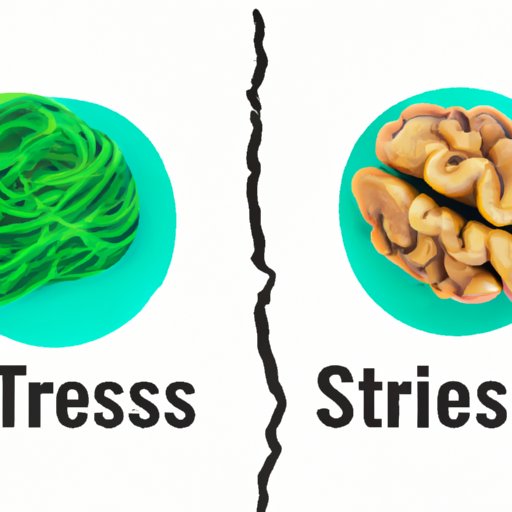
I. Introduction
Stress is an unavoidable part of life. It can originate from various sources, such as work-related pressure, relationship difficulties, or money problems. However, stress impacts not only our minds but also our bodies, and one of the most common physical symptoms is stomach pain. Understanding the link between stress and stomach pain can help us manage these symptoms better and prevent them from affecting our quality of life. This article provides an in-depth exploration of stress-induced stomach pain and natural ways to manage this discomfort.
II. The Physical Effects of Stress: Why Your Stomach Hurts and What You Can Do About It
Stress manifests as a reaction to a physical or emotional threat, triggering responses in our bodies that cause physiological changes. When we experience stress, our bodies release hormones such as cortisol and adrenaline, leading to an increase in heart rate, blood pressure, and breathing rate. These physiological changes can lead to various symptoms, including stomach pain.
Stress can cause stomach pain by inhibiting normal digestive processes. During times of acute stress, the body’s fight or flight response is activated, diverting blood and resources away from the digestive system. This diversion can slow down bowel movements, leading to constipation or stomach pain.
There are several types of stomach pain caused by stress, including indigestion, cramping, and bloating. Indigestion occurs when digestive enzymes and gastric acid build up in the stomach, leading to discomfort and a burning sensation in the upper abdomen. Cramping and bloating occur when muscles in the digestive tract contract abnormally or when gas accumulates in the intestine.
III. Is Stress Causing Your Digestive Issues? Understanding the Gut-Brain Connection
Our gut and brain are connected through the enteric nervous system, and this connection is bidirectional. Our emotions and thoughts can impact our gut, just as our gut health can impact mental health. When we experience stress, this connection can lead to various digestive issues, including stomach pains. Stress can lead to disruptions in the normal digestive process, leading to changes in the microbiome and nutritional deficiencies.
Stress can also cause the body to produce cytokines, inflammatory molecules that can lead to gastrointestinal inflammation. This inflammatory response can worsen gut issues, leading to pain and other digestive symptoms.
IV. The Link Between Stress and Stomach Pain: How to Manage Symptoms Naturally
Natural remedies can help alleviate stress-induced stomach pain. Maintaining a healthy, balanced diet can help prevent digestive issues, and avoiding trigger foods such as high-fat foods, caffeine, and alcohol can help reduce symptoms. Individuals can also incorporate stress management techniques, such as engaging in regular exercise, practicing meditation or yoga, and getting enough rest.
Sleep is crucial for the body to repair itself, and inadequate sleep can cause more stress and aggravate stomach pain. Exercise such as yoga, swimming, or walking can help reduce stress hormones and improve digestion by increasing blood flow to the GI system.
In addition to lifestyle modifications, natural supplements can also provide relief from stress-induced stomach pain. Peppermint oil, ginger, and chamomile tea are all-natural supplements that can help alleviate bloating, cramps, and indigestion. These supplements can also help reduce inflammation and improve digestion.
V. Feeling Anxious? Here’s Why Your Stomach Might be Reacting to Stress
Anxiety can cause stomach pain, and many people experience stress in the form of anxiety. When we’re anxious, our bodies release stress hormones that can lead to various physical symptoms, including stomach pain. Anxiety can also trigger muscle tension and digestive issues that cause stomach discomfort.
Anxiety can manifest in different ways in the body, with physical symptoms such as palpitations, sweating, and shortness of breath. These symptoms can exacerbate feeling anxious, and taking deep breaths or other relaxation techniques can help manage stress hormones and reduce stomach pain.
VI. Stop Stress from Affecting Your Gut: Tips for Managing Stress-Related Stomach Pain
Managing stress is crucial for preventing digestive issues. Practicing self-care is essential, and individuals should examine their different stressors and find ways to manage them effectively. Practicing self-compassion and seeking social support can help reduce symptoms of stress and prevent stomach pain.
Stress management techniques such as deep breathing, progressive muscle relaxation, and mindfulness meditation can all help reduce symptoms of stress. These techniques can help individuals manage their reactions to stressors and prevent stress-induced stomach pain.
Exercising regularly can also help reduce stress hormones and improve GI function. Engaging in gentle exercises such as yoga, swimming, or walking can help manage stress and prevent stomach pain. Individuals should also prioritize getting enough rest, as adequate rest can help the body repair itself and reduce stress levels.
VII. Understanding the Science of Stress: How It Triggers Stomach Discomfort and Ways to Cope
Stress triggers various changes in our bodies, leading to physical symptoms such as stomach discomfort. Understanding the science behind stress can help individuals manage symptoms more effectively. Coping mechanisms such as deep breathing, progressive muscle relaxation, and social support can all help manage stress-induced stomach pain.
Individuals should also practice positive self-talk and maintain a positive outlook. Keeping a gratitude journal or practicing affirmations can help redirect negative thinking patterns and reduce stress levels.
VIII. Conclusion
Stress can cause various physical symptoms, including stomach pain, and understanding the link between stress and stomach pain can help prevent and manage these symptoms. Natural remedies such as lifestyle modifications, natural supplements, and stress management techniques can provide relief from stress-induced stomach pain. Practicing self-care and seeking social support can also help individuals manage stress and prevent stomach discomfort.
In cases where stomach pain continues, individuals should seek medical advice. Stress-induced stomach pain can lead to more severe complications, and addressing symptoms early can help manage complications more effectively.





